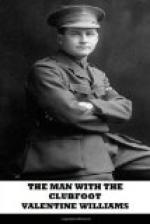“I can’t understand half you say,” he cried in accents shrill with irritability; “you mouth and mumble like an Englishman. You say you are an American?”
“Yes, sir,” I answered meekly, “but I resided for many years in England.”
“Well, it’s a good thing you’re not there now. Those English are just plumb crazy. They’ll never whip Germany, not if they try for a century. Why, look what this country has done in this war? Nothing can stand against her! It’s organization, that’s what it is! The Germans lead the world. Take their doctors! I have been to every specialist in America about my back and paid them thousands of dollars. And what good did they do me? Not a thing. I come to Germany, they charge me a quarter of the fees, and I feel a different man already. Before tackling the Germans, the English ...”
Thus he ran on. I knew the type well, the American who is hypnotized by German efficiency and thoroughness so completely that he does not see the reverse side of the medal.
He exhausted himself on the topic at last and bade me read to him again.
“Read about the affair at the Hotel Esplanade last night,” he commanded.
I had kept an eye open for this very item but, as Monica had said, the papers contained no hint of it. I wondered how Gerry knew about it. Monica would not have told him.
“What affair do you mean?” I said. “There is nothing about it in the papers.”
“Of course there is, you fool. What is the use of my hiring you to read the papers to me if you can’t find news that’s spread all over the place? It’s no use giving me the paper ... you know I can’t read it! Here, Josef will know!”
A man-servant had come noiselessly into the room with some clothes.
Gerry turned to him.
“Josef, where did you see that story you were telling me about an English spy assaulting a man at the Esplanade last night?”
“Dot ain’t in de paper, sir. I haf heard dis from de chauffeur of de Biedermanns next door. He wass at de hotel himself wid hiss shentleman lars’ night at de dance. Dey won’t put dat in no paper, sir.”
And the man chuckled.
I felt none too comfortable during all this and was glad to be told to read on and be damned.
I read to the young American all the morning. He went on exactly like a very badly brought up child. He was fretful and quarrelsome and sometimes abusive, and I had some difficulty in keeping my temper. He continually recurred to my English accent and jeered so offensively and so pointedly at what he called “your English friends” that I began to believe there was some purpose behind his attitude. But it was only part of his invalid’s fractiousness, for when the valet, Josef, appeared with the luncheon tray, the American seemed anxious to make amends for his behaviour.
“I’m afraid I’m a bit trying at times, Meyer,” he said with a pleasant smile. “But you’re a good fellow. Go and have your lunch. You needn’t come back till four: I always sleep after luncheon. Here, have a cigar!”




